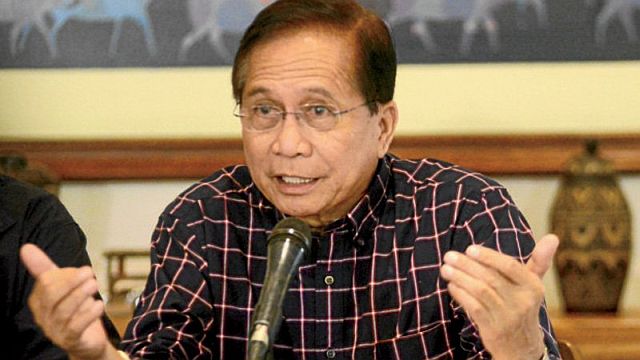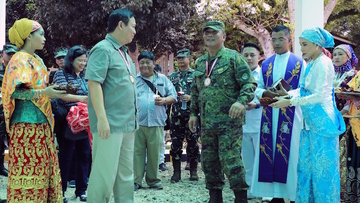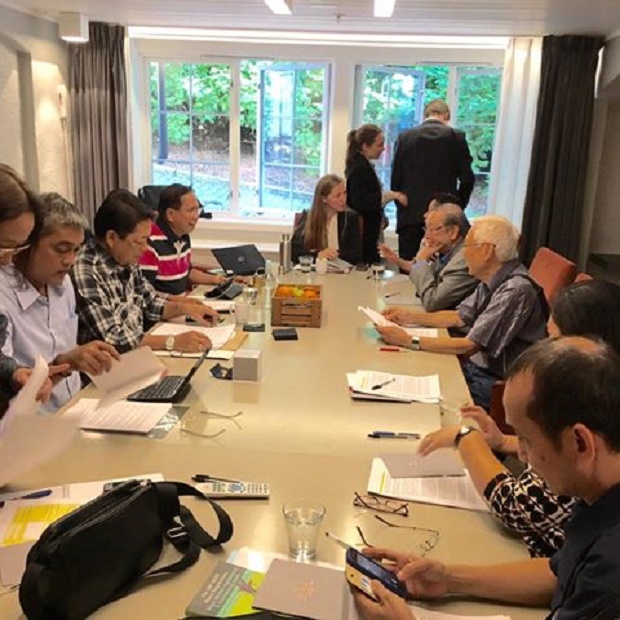From BenarNews (Oct 31):
Malaysia: Families of Kidnapped Sailors Miss Ransom Deadline
 Gustiah Sultan and her husband Tayudin Anjut sit with their two children during the Eid-ul-Fitr holiday in July 2016.
Gustiah Sultan and her husband Tayudin Anjut sit with their two children during the Eid-ul-Fitr holiday in July 2016.
The families of five Malaysian sailors kidnapped in July and apparently being held by Abu Sayyaf Group (ASG) militants in the Philippines are in limbo some two weeks after failing to meet the militants’ ransom demand.
Gustiah Sultan, a 46-year-old housewife who has acted as a spokeswoman for the sailors’ families, said she hoped for the best despite missing an Oct. 16 deadline to come up with a ransom of 2 million ringgit (U.S. $480,000). She said kidnappers threatened to behead the hostages if the families failed to come up with the money.
“I really don’t know what to do. All I could do is pray and hope that the government will help us with this troubled episode of our lives,” Gustiah told BenarNews.
On July 18, suspected ASG members kidnapped five crew members from the tugboat Serudong 3 during a hijacking at sea off the eastern Malaysian state of Sabah. The five men are Abd Rahim Summas, 62; Tayudin Anjut,45, Fandy Bakran, 26; Mohamad Jumadil Rahim, 23; and Mohd Ridzuan Ismail, 32. Ridzuan is from Felda Jengka 7, a palm oil settlement in Pahang state in peninsular Malaysia, while the other four are from Lahad Datu in Sabah.
Khalid Abu Bakar, the chief of Malaysian police, and Wan Abdul Bari Abdul Khalid, who heads the Eastern Sabah Security Command (ESSCOM), told BenarNews that they had no updates on the kidnappings. Abdul Rashid Harun, the police commissioner in Sabah, declined comment.
Gustiah, whose husband is Tayudin, has spoken to the media about efforts to raise funds to pay the ransom since the days following their kidnapping.
The Borneo Post reported on July 21 – three days after the men were taken – that Tayudin had contacted his employer about a ransom of 20 million ringgit ($4.76 million). Tayudin told his boss that the men were in good condition and were in Basilan, a province in the far southern Philippines.
In September, Gustiah served as a spokeswoman when the families sought permission from police to ask the public for donations to pay ASG’s ransom demand. This time, she said the kidnappers had demanded 100 million Philippine pesos (8.65 million ringgit or $2 million), the New Straits Times reported on Sept. 28.
The most recent ransom demand came on Oct. 12.
Gustiah was able to speak to her husband during the phone call and intelligence officers determined that the call came from ASG. She said her husband told her that his fellow hostages were mostly well, but surviving on little food and water.
“We don’t have that kind of money. Even after four days, we could only come up with 3,670 ringgit ($881) through donations, which is far off that the amount they demanded,” Gustiah told Benar.
She has not spoken with the captors since the deadline passed and does not know the status of her husband and his fellow sailors.
“Even after the deadline, we can only collect about 20,000 ringgit ($4,800) in cash. I don’t think we can manage what they demanded by year’s end. I even begged them that we can’t afford such money and needed more than four days to come up with that amount. I just hope my husband and the rest are fine,” Gustiah said.
‘Unwitting financiers’
Southeast Asia terrorism expert Rohan Gunaratna said governments that pay ransoms are “the unwitting financiers of ASG.”
“The only government that refused to pay was the Canadians and ASG beheaded their nationals. Canada should convene a regional and a global meeting to address this global challenge,” said Gunaratna, a columnist for BenarNews who directs the International Centre for Political Violence and Terrorism Research at the S. Rajaratnam School of International Studies in Singapore.
He added both Malaysia and Indonesia should work with the Philippines to develop a strategy to contain, isolate and eliminate ASG. Philippines alone is incapable of fighting ASG effectively.
Officials from both the Indonesian and Malaysian governments have denied that they paid ransoms earlier this year in securing the release of other sailors from their countries who had been held hostage by militants in the southern Philippines.
“Most ASG fighters support the Islamic State and the money will be used by ASG to grow and expand,” Gunaratna told BenarNews.
ASG, which has pledged allegiance to the extremist group Islamic State (IS), has collected millions of dollars through kidnappings in recent years, according to online reports.
This year alone, ASG has collected at least 354.1 million Philippines pesos (U.S. $7.3 million) from ransom paid for hostages, Philippine-based news website Rappler.com reported.
http://www.benarnews.org/english/news/malaysian/hostages-family-10312016142901.html





